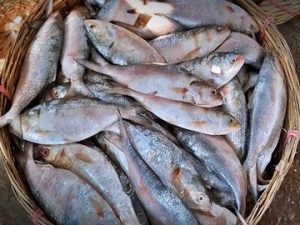DIGITAL NEWS GURU DELHI DESK:
Bangladesh Lifts Hilsa Fish Export Ban Ahead of Durga Puja: Approves 3,000 tonne shipment to India
In a move that has brought immense joy to food lovers and the Bengali community in particular, Bangladesh has announced the lifting of its ban on hilsa fish exports to India.
As part of this gesture, the government of Bangladesh will allow the export of 3,000 tonnes of hilsa fish to India ahead of the Durga Puja festival, one of the most celebrated events in West Bengal and other parts of India. This decision is significant not only from a cultural standpoint but also for its economic, diplomatic, and ecological ramifications.
The Cultural Importance of Hilsa

Hilsa (or “ilish” in Bengali) holds a special place in the hearts and kitchens of Bengalis. The fish is a delicacy, revered for its tender flesh and unique flavor. It forms an essential part of traditional Bengali cuisine, especially during festivals like Durga Puja, which is marked by grand feasts. Dishes like “shorshe ilish” (hilsa cooked in mustard sauce) and “bhapa ilish” (steamed hilsa) are iconic recipes that signify the essence of Bengali culinary heritage.
For years, hilsa has been more than just a food item; it has become a cultural symbol, representing the unity between Bangladesh and West Bengal, a region in India where millions of Bengalis reside. The fish’s availability from Bangladesh, which is home to the best quality hilsa, is often considered crucial for festive meals, especially during Durga Puja.
Background of the Export Ban

In 2012, Bangladesh imposed a ban on hilsa exports, citing concerns over depleting fish stocks and overfishing. Hilsa, a migratory species, is primarily found in the Bay of Bengal and swims upstream into Bangladesh’s rivers like the Padma and Meghna for spawning. The over-exploitation of hilsa had resulted in a dramatic decline in its population, which prompted the Bangladeshi government to impose strict regulations, including a halt to exports to ensure the fish’s conservation.
Since then, Bangladesh has undertaken several conservation measures to rebuild hilsa stocks. These efforts included restrictions on fishing during the breeding season, the establishment of protected areas, and offering financial support to fishermen during no-fishing periods. These policies have begun to pay off, as hilsa stocks have rebounded in recent years.
Lifting the Ban: A Diplomatic and Economic Gesture

Bangladesh’s decision to temporarily lift the hilsa export ban ahead of Durga Puja 2024 is seen as a goodwill gesture towards India, specifically West Bengal. The export of 3,000 tonnes of hilsa is expected to ease the shortage of the fish in Indian markets, which had driven prices up in recent years. This move is not only economically significant but also deeply symbolic, as it strengthens the cultural ties between the two countries, both of which share a long history of cross-border cultural exchange.
The timing of this decision is crucial. Durga Puja, which is one of the most important festivals in West Bengal, is synonymous with large community feasts where hilsa plays a starring role. Many households and restaurants in the region rely on the availability of hilsa to prepare traditional dishes that are in high demand during the festival. For Bengali food lovers, especially those in West Bengal, the arrival of Bangladeshi hilsa is a moment of celebration.
The lifting of the ban also reflects the improving bilateral relations between India and Bangladesh. Over the years, the two countries have worked to strengthen their ties through increased trade, economic cooperation, and diplomatic exchanges. Bangladesh is currently one of India’s most important trading partners in South Asia, and the export of hilsa is a token of Bangladesh’s appreciation for this growing relationship.
Economic Impact

The reintroduction of Bangladeshi hilsa into Indian markets will likely have a positive economic impact, particularly in West Bengal. Prices for hilsa, which had surged due to the supply crunch, are expected to stabilize with the influx of fish from Bangladesh. This will be a relief to consumers, traders, and restaurant owners, many of whom rely on hilsa sales during the festive season.
The economic benefits extend to the fishing industry in Bangladesh as well. The export of 3,000 tonnes of hilsa represents an opportunity for Bangladeshi fishermen and traders to earn revenue from India, one of the largest markets for hilsa. This is especially important given that hilsa is a high-value commodity in both countries.
Ecological Considerations

Despite the excitement surrounding the export of hilsa, there remain concerns about the ecological implications of increased fishing. Hilsa is still considered a vulnerable species, and overfishing could once again threaten its population if not carefully managed. Bangladesh’s government has imposed strict controls on the quantity of hilsa that can be exported to ensure that conservation efforts are not compromised.
The country’s fisheries ministry has clarified that the export will be closely monitored to prevent any negative impact on hilsa stocks. Additionally, the 3,000 tonnes allowed for export is a relatively small portion of the overall catch, meaning that Bangladesh’s domestic market and ecological sustainability will not be adversely affected.
Conclusion
The lifting of Bangladesh’s hilsa export ban comes as a significant moment for both India and Bangladesh. For the Bengali community in India, the return of hilsa from Bangladesh is a cause for celebration during Durga Puja, a festival deeply connected to food and cultural traditions. The move also underscores the growing diplomatic and economic ties between the two neighbors.
However, this development must be balanced with careful ecological management to ensure that hilsa stocks continue to recover. As Bangladesh demonstrates its ability to sustainably manage its natural resources, this decision offers a perfect example of how economic needs and conservation goals can coexist. The reintroduction of hilsa to Indian markets this year is more than just a commercial transaction; it is a celebration of shared cultural heritage and a sign of goodwill between two nations.
YOU MAY ALSO READ: Arvind Kejriwal speech at Jantar Mantar: Questions to RSS Chief Mohan Bhagwat








